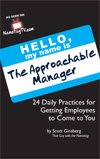
 Today we’re going to wrap up our discussion becoming known as the most approachable person in your organization.
Today we’re going to wrap up our discussion becoming known as the most approachable person in your organization.
(If you haven’t read Part 1, Part 2 and Part 3, knock yourself out.)
So, whether you’re an office professional, middle manager, C-level executive or part of the overnight cleaning crew, executing these strategies will accomplish three goals:
(1) Boost the net worth of your human capital
(2) Attract MORE attention, MORE people and MORE opportunities into your world, and
(3) Reduce the possibility that your company will kick your butt to the curb in this crappy economy.
1. Give others space to be who they are. First, set the tone by giving yourself space to be who YOU are. That’s the hardest part. Owning your Truth and letting it shine – even if parts of it aren’t perfect.
Second, honor and respect the distinctiveness of others. For example, when someone shares his passion – especially when it’s something unusual, obscure or completely opposite of what you do (birding, for example) respond with, “Cool!” or “Wow!” These complimentary, yet objective words will invite the other person to share more, thus eliminating the possibility that he will remain mediocre.
Third, shut up. If you want to give people space to be who they are, just stop talking. Silence is the great arbiter of Truth. Your goal is to learn to play the game called, “Let’s See How Long I Can Get This Person To Talk About What They Love.”
This grants people permission to dig deep inside themselves and express what’s alive and true. And the best part is: You always win. And so does the other person. Because once people have clearly communicated who they are, they can relax. Remember: People need to feel assured that they can be themselves around you. Are you granting others space to talk? Are you granting others space to BE? And what would happen to your career if you became known as the best listener in your organization?
2. Meet and touch people where they are. No judgments. No evaluations. No appraisals. That’s approachable. And, I know: “Not judging people” is easier said than done. Fine. Try this: Articulate what’s occurring. Say what you see. Verbalize your observations. Respond to someone’s immediate experience and dance in the moment with language like, “I noticed,” “It looks like,” and “I have an observation.”
Doing so helps you observe without accusing, insinuate without imposing and describe without prescribing. What’s more, “saying what you see” is objective, non-judgmental, non-comparison based and emotionally unreactive. It’s a statement of observation. An impartial piece of feedback that doesn’t challenge someone’s character or attitude, it simply meets them where they are.
Best yet, it prevents the possibility of leaving somebody feeling unheard. What is this person experiencing because of what is happening? How is it possible that this person could think or behave in this way? And under what circumstances would it make perfect sense to do so?
3. Show people that their feelings are legitimate. Avoid phrases like, “You don’t really feel that way,” “Oh, don’t say that,” or “You’re making too much of a fuss about this.” They come off as insincere and patronizing. And while you may THINK you’re listening, you’re actually doing more damage than if you had said nothing.
I’ve dubbed these rote responses “You’re Not Helping Phrases.” Because that’s exactly what they do – detract from the effectiveness of your listening practice. And especially when you’re dealing with a person who’s upset, angry, suffering or highly emotional, you want to respond as genuinely as possible.
Consider saying, “You have a right to feel that way,” “I would be frustrated too,” or “It’s OK to be upset.” Remember: People are entitled to whatever feelings arise. Your challenge is to honor their current experience. So, watch your words. Regulate your rote responses. Steer clear of platitudes, minimizers, empty promises, shorthand listening techniques and false empathy.
Because the last thing you want someone to think is, “Yeah, you’re NOT helping.” How are you showing people that their feelings are legitimate? What if you saw everyone as important? And what needs to be developed in you to better handle your judgment of others?
4. Do not despise the day of small beginnings. Top Ten Scriptures from the Old Testament, in my opinion. (Zechariah 4:10) And, if you interpret this philosophy from an interactional perspective, it takes on a very cool meaning.
Part of being an approachable leader is the unconditional watering of people’s success seeds. This style of attending to others, as psychologist Carl Rogers wrote, “Accepts an individual’s worth and morality, thereby creating the best possible conditions for personal growth.”
My friend and fellow coach Dixie Gallaspie is a walking translation of this attribute of approachability. That’s what I love about having a conversation with her: The word “can’t” doesn’t exist in her vocabulary. She believes in everybody. She’s a booster, not a buster. A liberator, not a legislator.
And Dixie will ALWAYS value people’s dreams, crazy or impossible as they may sound. Ultimately, her confidence in others changes their confidence in themselves, which, for many of her clients – myself included – has launched their career trajectories.
So, here’s the secret: Regularly enlarge people so they feel less invisible and more essential. Deposit good words inside of them like, “I appreciate you,” “I believe in you” and “I value your dream.” You never know what new beginning your words will initiate. What do people get when they get you? How are you enlarging them? And what, specifically, could you say today to water somebody’s success seeds?
5. Make sure people like themselves when they are with you. It’s not how you feel about you; it’s not how they feel about you; it’s about how THEY feel about THEM. That’s all that matters.
A truly approachable person is one with whom another never feels small. One who forces people to have a good opinion of themselves. One who gets people to feel more highly of themselves. One who helps people recall their high performance patterns.
Suggestion: Don’t just take notes on what people say; tell THEM to take notes on what THEY just said. Here’s how you do it: After somebody shares a powerful insight, look at them and say, “That’s great. Have you written about that yet?” or “WRITE THAT DOWN!!!” Odds are, they’ll smile, possibly blush, and learn to honor their brilliance more often.
I practice this with my colleagues at least three times a week, and it never fails to energize people’s postures – both physically and spiritually. That’s the best part. Their shift in body language as they begin writing demonstrates not only gratitude, but also personal pride. Remember: Help people encounter overlooked aspects of themselves so you can leave people in LOVE with themselves. How do most people feel when they’re around you? How do you leave people? And what, specifically, are you doing every day to make others feel essential?
LET ME ASK YA THIS…
Do people flock to you like bees to honey?
LET ME SUGGEST THIS…
For the list called, “26 Rapid-Fire Strategies for becoming the Most Approachable Person in Your Organization,” send an email to me, and I’ll send you the list for free!
* * * *
Scott Ginsberg
That Guy with the Nametag
Author, Speaker, Coach, Entrepreneur
[email protected]
 If they can’t come UP to you; how will they ever get BEHIND you?
If they can’t come UP to you; how will they ever get BEHIND you?
Buy Scott’s new book and learn daily practices for becoming a more approachable manager!
Pick up your copy (or a case!) right here.
